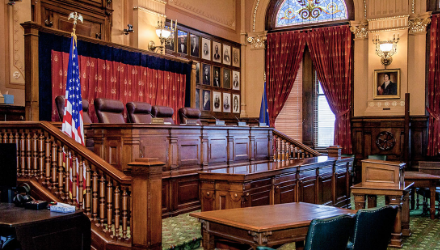
If the police are mostly on the wrong side, then it shouldn’t be surprising that most courts will be too.
It’s where their class affinities lie, after all.
Judges are wealthy and, for the most part, they grew up that way. Their circles of friends and acquaintances are wealthy. Most don’t know anyone socially who isn’t.
They all have significant, and in many cases lifetime-appointment-level, job security.
They are not threatened in any personally existential way by the chaos in the government. Since most of them are Republicans, even after the failed insurrection, they can actually be expected to sympathize with it.
And they are accustomed to taking months, or years, to decide a case.
They cannot be expected to understand urgency.
So, to them, very little is urgent in the same sense that it is for the rest of us; to them, a month or two delay in a case is rushing things whereas to most citizens a month can easily mean bankruptcy and starvation.
So when you see the courts taking weeks to decide on whether to issue a temporary order blocking a particular mass-firing of an agency while the case over its legality is tried, that is their idea of a speedy process. They can’t really see it how the rest of us do.
After all if their paycheck were delayed for a month or two, it would be frustrating but not generally catastrophic.
So, regardless of how they rule it will be too late.
It took years for the insurrection prosecutions to wind through the courts, and that’s just for the mob; the leaders and intended-beneficiaries of it were never even charged.
And it will take years for each separate case over the legality of the coup having destroyed this agency or that department to be litigated. But, of course, by the time they make that decision the agency or department will already be destroyed; the organization will be gone and its former staff dispersed to look for other work.
U.S. courts are simply too slow to cope with this; by the time they respond, the damage will already be too far along.
Even if they do end up on the right side, it will be too late.
So, remember this for later: when it’s time to design whatever comes after the United States, its legal system needs to able to move much more quickly than ours does.
And its judges should be well-paid, but not so well that they can’t see what it’s like for everyone else.
- You Should Read This: The Hater’s Guide To The AI Bubble - 2025-07-22
- Archive: Using Copyright to Protect Privacy - 2025-07-21
- Archive: How to Manage Advertising on K5? - 2025-07-18

One thought on “Authoritarians United: Most Courts Will Be Too Slow To Matter”